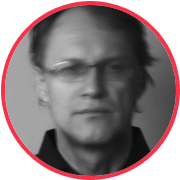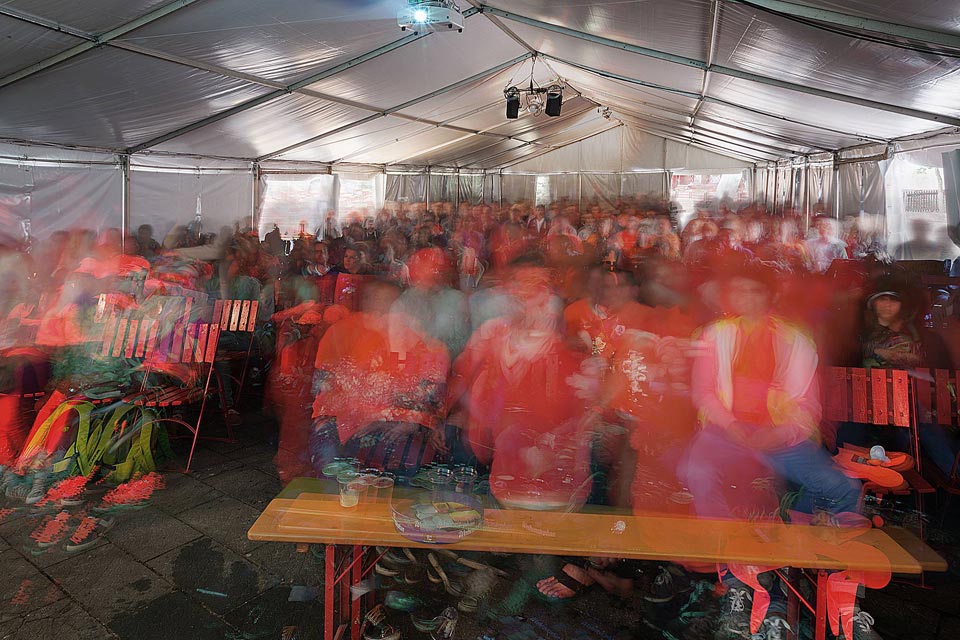Michael Wesely’s works are more than photographs made with ultra-long exposure. His photographs are endlessly long; they literally preserve time. These photographs combine the past and the present, foundation pit and piles with a finished house. It takes months, sometimes years to make one frame. Wesely doesn’t have any students, only several assistants, he builds his cameras himself and keep his technology a secret.

Michael Wesely started his experiments with ultra-long exposure – from several weeks to several months – in the 1990s. “Time is like a vehicle I use to arrive at my ultimate goals – images,” he says.
In 1997 there was a large-scale reconstruction of Daimler-Chrysler building at the Potsdamer Platz in Berlin. Wesely first tried his technology. He placed his camera in the spot with the good view and left it there with an open shutter for 26 months. During this time there was construction on the square, its shape changed dramatically, and all of these changes were preserved in one frame. Moving objects blurred together into a haze, and images of static objects that were demolished or rebuilt covered each other in layers.
{ “img”: “/wp-content/uploads/2015/05/Wesely_05.jpg”, “alt”: “”, “text”: “” },
{ “img”: “/wp-content/uploads/2015/05/Wesely_06.jpg”, “alt”: “”, “text”: “” },
{ “img”: “/wp-content/uploads/2015/05/Wesely_08.jpg”, “alt”: “”, “text”: “” }
In 2001 Wesely was invited to New York to document the reconstruction of the Museum of Modern Art. This time he used eight cameras that he placed in four spots around the perimeter of the square under reconstruction. The shoot lasted a record 34 months – from August 2001 to June 2004. If you take a close look and learn to visually separate layers, you can see the old museum building and its reconstructed version at the same time.
{ “img”: “/wp-content/uploads/2015/05/Wesely_07.jpg”, “alt”: “”, “text”: “” }
The photographs of Michael Wesely were exhibited in the renovated Museum of Modern Arts in 2004 in the “Open Shutter Project 2001-2004” exhibition. Later Michael published a book dedicated to this project.
Photographs of ghost squares became signature photographs for Wesely. All the events were reflected in the frame: the movement of cranes, people rushing around, the erection of new buildings and the demolition of the old ones. The sky in the pictures is ruled with broad lines – this is the trajectory of the moving sun that changes with time. Or rather, these lines show how the Earth moves during the year.
Wesely is not the only photographer who makes photographs with ultra-long exposure. However, he is the only one who achieves the shooting this long and produces quality, not light-struck shots. He keeps the details of his technology secret, but he agreed to demystify some aspects of his work.
The main question is, of course, what kind of a camera is capable for exposure of this length. The photographer builds his devices for each project himself. “These are not pinhole cameras and not industrially made cameras,” Wesely told Bird in Flight. “All the parts of the cameras are handmade, except for the wide-angle lenses”.
The external appearance of the camera is not a secret, and Wesely even posts the sketches of future cameras online, but does not reveal the important details of the design.
{ “img”: “/wp-content/uploads/2015/05/Wesely_10.jpg”, “alt”: “”, “text”: “” }
{ “img”: “/wp-content/uploads/2015/05/Wesely_11.jpg”, “alt”: “”, “text”: “” }
For his work Michael Wesely presumably uses 4×5 wide-angle cameras. Using neutral filters and a very small diaphragm makes exposure thousands of times longer than usually. According to Wesely, he can make exposure endlessly long, 40 years if necessary.
The cameras look rather massive – they need to stay for several months or even years in the street, close to the active construction, and not move a millimeter. Powerful waterproofing allows them to work at any weather. In one of his interviews Wesely admitted that he makes his cameras massive on purpose, so that no one would want to move them.
{ “img”: “/wp-content/uploads/2015/05/Wesely_09.jpg”, “alt”: “”, “text”: “” }
“It has happened that cameras got damaged,” Wesely told us. “One camera was damaged in Frankfurt during construction on the roof where it was installed. I could not use the images from that camera. No one ever tried to steal them. I install the cameras in places where they are not that easy to reach.”
Michael usually works on several projects at the same time. “I have many cameras in different locations, I don’t think I can count them all. The projects lasts as long as the reconstruction. For example, my cameras are now documenting the reconstruction of City Palace in Berlin. This reconstruction is planned to last from 2014 to 2019.”
{ “img”: “/wp-content/uploads/2015/05/Wesely_12.jpg”, “alt”: “”, “text”: “” },
{ “img”: “/wp-content/uploads/2015/05/Wesely_13.jpg”, “alt”: “”, “text”: “” },
{ “img”: “/wp-content/uploads/2015/05/Wesely_14.jpg”, “alt”: “”, “text”: “” },
{ “img”: “/wp-content/uploads/2015/05/Wesely_15.jpg”, “alt”: “”, “text”: “” }
Wesely checks on his cameras from time to time. “Before I receive a ready image, I can’t forget about any of the projects. Of course, there is no continuous observation, but I don’t forget about them either,” he says.
Reconstruction of buildings and squares is not the only sphere where Wesely works. He has other projects as well, but they are also based on long exposure. There projects don’t last that long, only from several minutes to several days. For example, in 2013 he published a book of more than 200 portraits shot using this method. Wesely placed the model in front of the camera and set exposure at 5 or more minutes. Michael thinks that in this time the person opens up more than during the usual immediate shooting.
Another project was Still Lives. It was about withering flowers. It took about a week to shoot every bunch of flowers, and these photographs show all the stages of the life of a cut flower.
{ “img”: “/wp-content/uploads/2015/05/Wesely_16.jpg”, “alt”: “”, “text”: “” },
{ “img”: “/wp-content/uploads/2015/05/Wesely_17.jpg”, “alt”: “”, “text”: “” },
{ “img”: “/wp-content/uploads/2015/05/Wesely_18.jpg”, “alt”: “”, “text”: “” },
{ “img”: “/wp-content/uploads/2015/05/Wesely_19.jpg”, “alt”: “”, “text”: “” }
During the FIFA World Cup in 2014 Michael placed his cameras not in the stadiums, but in other places where the fans gathered to watch the game. He set the length of exposure equal to the length of the match, and received the picture of the whole game in one frame, revealing the quintessential emotions of the fans.
{ “img”: “/wp-content/uploads/2015/05/Wesely_01.jpg”, “alt”: “”, “text”: “” },
{ “img”: “/wp-content/uploads/2015/05/Wesely_02.jpg”, “alt”: “”, “text”: “” },
{ “img”: “/wp-content/uploads/2015/05/Wesely_03.jpg”, “alt”: “”, “text”: “” },
{ “img”: “/wp-content/uploads/2015/05/Wesely_04.jpg”, “alt”: “”, “text”: “” }
Despite a great number of photographers who specialize in long exposure, Michael does not have direct competitors. Wesely doesn’t have any students and works only with a small team of assistants. His work has something in common with solarography, when paths of celestial bodies are documented with the help of long exposure, but in Wesely’s photographs the sky and the sun are just marginal elements of the whole picture.
Alexey Titarenko from St. Petersburg probably has the closest style to Wesely. He also uses long exposure and prefers urban themes, but he focuses streams of people. Wesely’s philosophy is to show how time flows, document changes, convey the atmosphere and leave a lot of space for interpretation of each frame, and Titarenko’s photographs have clear, easily read meaning. He finds the point of stability in the whirlpool of life, emphasizing a certain person, their story or character.
Both Alexey Titarenko and Michael Wesely prove with their work that you can find new aspects even in the well-studied technology of photography. You can, for instance, learn to play with time.
{ “img”: “/wp-content/uploads/2015/05/Titarenko_01.jpg”, “alt”: “”, “text”: “Alexey Titarenko” },
{ “img”: “/wp-content/uploads/2015/05/Titarenko_02.jpg”, “alt”: “”, “text”: “Alexey Titarenko” },
{ “img”: “/wp-content/uploads/2015/05/Titarenko_03.jpg”, “alt”: “”, “text”: “Alexey Titarenko” }





